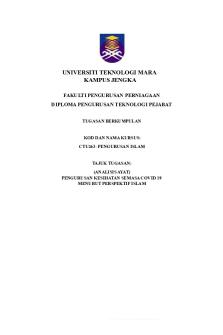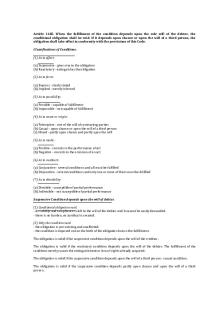READ Article 263 Notes PDF

| Title | READ Article 263 Notes |
|---|---|
| Course | European Union Law |
| Institution | University of Strathclyde |
| Pages | 7 |
| File Size | 200.5 KB |
| File Type | |
| Total Downloads | 192 |
| Total Views | 264 |
Summary
JUDICIAL REVIEWARTICLE 263 TFEU – ACTION FOR ANNULMENTAricle 263 TFEU(ex Aricle 230 TEC) The Court of Jusice of the European Union shall review the legality of legislaive acts, of acts of the Council, of the Commission and of the European Central Bank, other than recommendaions and opinions, and of ...
Description
JUDICIAL REVIEW ARTICLE 263 TFEU – ACTION FOR ANNULMENT Article 263 TFEU (ex Article 230 TEC) The Court of Justice of the European Union shall review the legality of legislative acts, of acts of the Council, of the Commission and of the European Central Bank, other than recommendations and opinions, and of acts of the European Parliament and of the European Council intended to produce legal effects vis-à-vis third parties. It shall also review the legality of acts of bodies, offices or agencies of the Union intended to produce legal effects vis-à-vis third parties. It shall for this purpose have jurisdiction in actions brought by a Member State, the European Parliament, the Council or the Commission on grounds of lack of competence, infringement of an essential procedural requirement, infringement of the Treaties or of any rule of law relating to their application, or misuse of powers. The Court shall have jurisdiction under the same conditions in actions brought by the Court of Auditors, by the European Central Bank and by the Committee of the Regions for the purpose of protecting their prerogatives. Any natural or legal person may, under the conditions laid down in the first and second paragraphs, institute proceedings against an act addressed to that person or which is of direct and individual concern to them, and against a regulatory act which is of direct concern to them and does not entail implementing measures. Acts setting up bodies, offices and agencies of the Union may lay down specific conditions and arrangements concerning actions brought by natural or legal persons against acts of these bodies, offices or agencies intended to produce legal effects in relation to them. The proceedings provided for in this Article shall be instituted within two months of the publication of the measure, or of its notification to the plaintiff, or, in the absence thereof, of the day on which it came to the knowledge of the latter, as the case may be.
The procedure set out in Article 263 TFEU is the main procedure by which the legality of EU legal acts can be judicially reviewed. The General Court (formerly the Court of First Instance) rules on actions for annulment brought by individuals, companies and, in some cases, EU governments.
1. REVIEWABLE ACTS Categories of reviewable acts: Legislative acts: e.g. regulations, directives, and decisions. Regulatory acts: defined in Case T-18/10 Inuit Tapiriit Kanatami and others v. European Parliament and Council: [T]he meaning of ‘regulatory act’ for the purposes of the fourth paragraph of Article 263 TFEU must be understood as covering all acts of general application apart from legislative acts [i.e. the acts mentioned in Article 288 TFEU]. Any other acts, notwithstanding their form, when they are intended to produce legal effects (Case 60/81 IBM v Commission).
2. LOCUS STANDI There are 3 categories of applicants: 1. Privileged applicants. 2. Semi-privileged applicants; and 3. Non-privileged applicants.
2.1. Privileged applicants: They are: - The Member States. - The European Parliament. - The Council (of ministers); and - The Commission Privileged applicants are entitled to challenge any binding act under Article 263 TFEU.
The European Parliament’s standing: Initially the EP had no standing under Article 263 TFEU (ex Article 230 TEC) unlike the other EU institutions which had unlimited standing. The EP challenged its inferior position in the Court of Justice: - The Court ruled that the EP could not bring an action under Article 230 TEC (Case 302/87, European Parliament v. Council (‘Comitology’)). - The EP was subsequently allowed the EP to bring actions under Article 230 TEC for the purpose of ‘protecting its prerogatives’ (Case C-70/88 Parliament v. Council (Chernobyl)). The Court followed the opinion of Advocate General van Gervern, who had deplored the lack of standing of the EP; he had opined that the ‘Parliament [was] under tutelage’ and that this was unacceptable. This ruling was incorporated
into the TEU and Article 230 TEC was amended accordingly. However, the standing of the EP remained more limited than that of the Council and the Commission. Article 230 TEC was further amended by the Treaty of Nice => The EP is now on an equal footing with the other EC institutions and has full legal standing under Article 263 TFEU.
2.2.
Semi-privileged applicants
Article 263(3) grants semi-privileged position to: The Court of Auditors. The European Central Bank; and The Committee of the Regions. In the case of semi-privileged applicants, the jurisdiction of the Court is confined to reviewing acts of these institutions that are necessary for the protection of their prerogatives.
2.3.
Non-privileged applicants: natural and legal persons
The locus standi of persons (natural and legal persons) under Article 263 TFEU is much more limited than that of privileged and semi-privileged applicants. It is necessary to distinguish between: 1. Acts addressed to the legal or natural person seeking judicial review under Article 263 TFEU. 2. Acts addressed to a party other than the person seeking judicial review under Article 263 TFEU. 2.3.1. Acts addressed to the applicant: When the act is addressed to the applicant, the latter will have standing to challenge. 2.3.2. Acts addressed to another person When a natural or legal person seeks to challenge an act addressed to another party: The act (other than regulatory acts) must be of direct and individual concern to the person seeking to challenge the act; or The regulatory act must be of direct concern to the person seeking to challenge the act and not entail implementing measures. 2.3.2.1. Concept of ‘direct concern’: To determine whether the act is of direct concern to the person seeking to challenge it, the General Court will ascertain whether the applicant is particularly affected by the act in a
way most others are not affected because of the applicant’s characteristics or circumstances or those of the limited group of which the plaintiff is a member. See e.g. - Case 41-4/70 International fruit NV v Commission (No 1). - Cases 113 and 118-21/77 Japanese ball-bearing cases. 2.3.2.2. Concept of individual concern: Plauman test: Case 25/62 Plaumann & Co v Commission. The Court held that: To establish individual concern, the applicant must prove that the decision affects him or her because of ‘certain characteristics which are peculiarly relevant to him, or by reason of circumstances in which he is differentiated from all other persons, and not by the mere fact that he belongs to a class of persons who are affected. Plaumann test . The test was confirmed in Case C-500/00 Union de Pequeños Agricultores (UPA) v Council The Court’s restrictive interpretation of non-privileged applicants’ locus standi has been heavily criticised, but the Court has so far refused to widen access to the Court under Article 263 TFEU for this group of applicants. See e.g. - Opinion of the Advocate General in Union de Pequeños Agricultores v Council. - Case T-177/01 Jego-Quere Cie v. Commission.
3. TIME-LIMITS An applicant, whether an individual, a Member State or a Union institution, must bring a claim for annulment within two months of: The publication of the measure, Its notification to the claimant, or in the absence thereof, The day on which it came to the knowledge of the latter, as the case may be (Article 263(3)). 4. GROUNDS FOR ANNULMENT Article 263 TFEU provides four grounds for annulment: 1. Lack of competence. 2. Infringement of an essential procedural requirement. 3. Infringement of the treaty or any rule of law relating to its application; and 4. Misuse of powers. These categories are not mutually exclusive and often more than one ground is cited in a case. 4.1.
Lack of competence:
The institution responsible for adopting the measure in question must have legal authority to do so. This may derive from the TFEU or secondary legislation. On a number of occasions, EU law has been challenged a having been enacted under the wrong legal basis (see case C-295/90 Parliament v Council). The Court allows the EU institutions some latitude in their choice of legal base and their scope for action under that base. Case C-298/94 Portugal v Council: In this case, the Portuguese government sought the annulment of a decision on the basis that the wrong Treaty base had been used. The decision referred to what are now Articles 144 and 211TFEU respectively, dealing with commercial policy, which only required that the decision be adopted by qualified majority vote. The Portuguese government claimed that the agreement to which the decision related contained provisions aimed at protecting democracy and human rights in India, and should have been made under Article 352TFEU, which would have required unanimity. The CJ held that one the facts of the case the provisions of the then Article 130y (now Article 211TFEU) were broad enough to encompass the complained-of clauses, and that to rule otherwise would be to deprive the specific clauses of their substance.
4.2.
Infringement of an essential procedural requirement:
EU institutions, when enacting binding measures, must follow the correct procedures. These procedures may be laid down in the Treaty or in secondary legislation. In Roquette Frères SA v Council (Case 138/79), and Maizena GmbH v Council (case 139/79), a Council regulation was annulled on the Grounds of the Council’s failure to consult Parliament, as it was required to do under Article 43TFEU. Although the Council had consulted the EP, it was held not to have given Parliament sufficient time to express an opinion on the measure in question. Where not time-limit is imposed, it is presumed that the EP must be given a reasonable time in which to express its opinion.
4.3.
Infringement of the treaty or any rule of law relating to its application:
A measure can be annulled on this ground, for instance, when it breaches general principles of EU law. For example, in Royal Scholten-Honig (Holdings) Ltd v Intervention Board for Agricultural Produce (cases 103 and 145/77), an EU regulation was held invalid for breach
of the principle of equality. In August Töpfer & Co GmbH v Commission (case 112/77) a decision was annulled for breach of the principle of legal certainty and for breach of the applicant’s legitimate expectations.
4.4.
Misuse of powers:
This concept stems from the French détournement de pouvoir (the use of a power for purposes other than those for which it was granted). Misuse of powers has been defined by the CJ as: The adoption by a Union institution of a measure with the exclusive or main purpose of achieving an end other than that stated or evading a procedure specifically prescribed by the Treaty for dealing with the circumstances of that case (case C156/93 Parliament v Commission). This provision has been narrowly interpreted. In Fédération Charbonnière de Belgique v High Authority (case 8/55), in interpreting the comparable provision ( Article 33 of the ECSC Treaty), the Court held that a measure will not be annulled if the authority had acted from mixed motives, proper and improper, as long as the proper purpose was dominant. It is thus a difficult ground to establish.
There is much overlap between the four grounds for annulment. The Court rarely examines each one precisely and is often vague as to which ground forms the basis of its decision.
5. Consequences of a successful action If an annulment action under Article 263 is successful, the act will be declared void under Article 264 TFEU. A measure may be declared void in part only, provided that the offending part can be effectively removed. Under Article 264(2), the Court may, following a successful action for annulment , ‘state which of the effects of the Regulation which it has declared void shall be considered definitive’. This has been done in the interest of legal certainty to avoid upsetting past transactions based on a regulation, a normative act. In Roquette Frères SA v France (case 145/79), a declaration of invalidity of a Union regulation was held to be purely prospective in its effects. However, in Parliament v Council (case C-360/93), the CJ annulled two
Council’s decisions and, on the basis of Article 264(2), ordered that all the effects of the annulled decisions must be maintained in force.
6. CONSEQUENCES OF A SUCCESSFUL ACTION If an annulment action under Article 263 TFEU is successful, the act will be declared void under Article 264 TFEU. A measure may be declared void in part only, provided that the offending part can be effectively removed.
Reading: Craig and de Búrca, chapters 15 and 16. Steiner & Woods EU Law, chapter 12. Further reading: Albertina Albors Llorens, ‘The standing of private parties to challenge Community measures : has the European Court missed the boat?’ (2003) 62(1) Cambridge Law Journal 72-92. John A. Usher, ‘Direct and individual concern: an effective remedy or a conventional solution?’ (2003) 28 European Law Review 575. Lawrence W. Gormley, L, ‘Judicial Review: Advice for the Deaf?’ (2006) 29(4) Fordham International Law Journal 655...
Similar Free PDFs

READ Article 263 Notes
- 7 Pages

Nichtigkeitsklage Art 263 AEUV
- 2 Pages

Tugasan 3 - CTU 263
- 21 Pages

Schema §263 Part1
- 1 Pages

COM 263 DQ - Discussion
- 8 Pages

Compiler Design Notes - read it
- 184 Pages

Review article notes - Copy
- 15 Pages

Craig Article Notes
- 8 Pages

Read Me - Lecture notes 1
- 35 Pages

Article - Kamaraj - Lecture notes 1
- 14 Pages

Cin(E)-Poetry Article Notes
- 2 Pages

FIN 263 script group assignment
- 10 Pages

Article 101 - Lecture notes 2
- 15 Pages

Article 1182 - Lecture notes 3
- 1 Pages
Popular Institutions
- Tinajero National High School - Annex
- Politeknik Caltex Riau
- Yokohama City University
- SGT University
- University of Al-Qadisiyah
- Divine Word College of Vigan
- Techniek College Rotterdam
- Universidade de Santiago
- Universiti Teknologi MARA Cawangan Johor Kampus Pasir Gudang
- Poltekkes Kemenkes Yogyakarta
- Baguio City National High School
- Colegio san marcos
- preparatoria uno
- Centro de Bachillerato Tecnológico Industrial y de Servicios No. 107
- Dalian Maritime University
- Quang Trung Secondary School
- Colegio Tecnológico en Informática
- Corporación Regional de Educación Superior
- Grupo CEDVA
- Dar Al Uloom University
- Centro de Estudios Preuniversitarios de la Universidad Nacional de Ingeniería
- 上智大学
- Aakash International School, Nuna Majara
- San Felipe Neri Catholic School
- Kang Chiao International School - New Taipei City
- Misamis Occidental National High School
- Institución Educativa Escuela Normal Juan Ladrilleros
- Kolehiyo ng Pantukan
- Batanes State College
- Instituto Continental
- Sekolah Menengah Kejuruan Kesehatan Kaltara (Tarakan)
- Colegio de La Inmaculada Concepcion - Cebu

